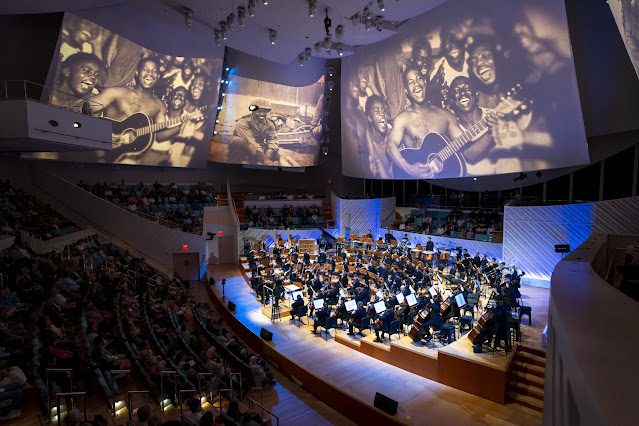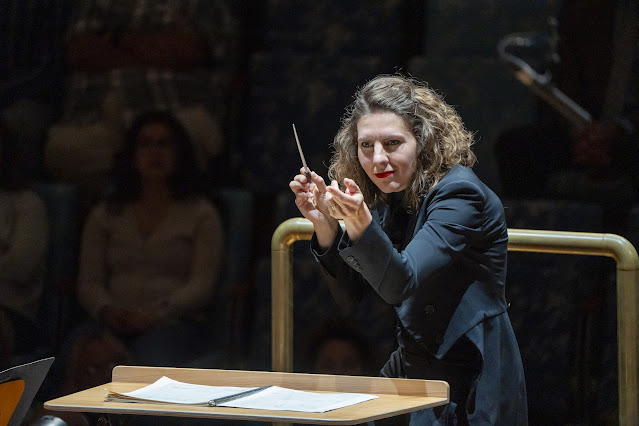 |
| New World Symphony Veterans Day Concert: A World War II Journey – Michael Tilson Thomas Performance Hall (Photo: Alex Markow, courtesy of New World Symphony) |
New World Symphony Veterans Day Concert: A World War II Journey; conductor: Lidiya Yankovskaya, Emily Magee (soprano), British historian James Holland (host), New World Symphony
New World Center, Michael Tilson Thomas Performance Hall, Miami Beach, Florida
Reviewed by Robert J Carreras, 11 November 2024
In what we hope will be the first of an occasional series from Florida, Robert J Carreras reports on the New World Symphony Orchestra’s Veterans Day Concert: A World War II Journey
Thirty-six days. The severity of the coming 36 days was made plain to 20-year-old marine Richard Jessor by a U.S. Navy commanding officer: “Tomorrow night at this time, a lot of you are going to be dead.” From Brooklyn to Iwo Jima – over 7000 miles – in less than a year’s time. Such was the journey of many a young American boy soldier as of December 7, 1941.
A soldier flying with Windtalkers over the Pacific as explosions litter the sky. A soldier rushing desperately to scale a vertical wall of earth at Normandy. A soldier scanning flight plans and tactics to take on the Luftwaffe. A Tuskegee soldier from Haiti, from Puerto Rico, from Jamaica. A soldier thrust into fighting alongside other young boys from lands far and wide. A soldier from Brixton. A soldier from Portree. A soldier from Cooladdi. A soldier from Pripyat. A soldier liberating the concentration camp at Bergen Belsen. A soldier from Peoria; from Massapequa; from Snohomish; from Kalamazoo.
Richard Jessor of Brooklyn (and you had better get it right – “Brooklyn is different than New York!”) captivated and charmed with memories of his 36 days in Iwo Jima, a warm-up to New World Symphony’s (NWS) Veterans Day concert: A World War II Journey on Friday, November 9, 2024. This concert is in the larger context of the 2024-25 season’s Resonance of Remembrance, marking the 80th anniversary of World War II (WWII) and the Holocaust. As ever, NWS curates a multimedia experience; all selections for this evening demonstrate a thoughtful and creative expression of NWS’s vision to account for diversity, equity, inclusion and belonging.
 |
| New World Symphony Veterans Day Concert: A World War II Journey – Lidiya Yankovskaya, conductor – Michael Tilson Thomas Performance Hall (Photo: Alex Markow, courtesy of New World Symphony) |
Classical music is experiencing a proverbial enlightenment period with women leading historically acclaimed orchestras internationally. NWS is at the vanguard of that inertia, as evidenced by the presence of Xian Zhang in October and Lidiya Yankovskaya here.
Striding premeditatively across the stage to the podium, Yankovskaya’s attire was as an invocation of purpose and panache – and it was also an invitation. Hers were form-fitting, soft fabric tails and heel-ornamented patent leather oxfords (was that gold broguing on the counters and quarters?). Yankovskaya is a sensitive musician to this sensitive music, to the night’s sensitive theme and proceedings. She exhibits a strong tempo center that is emphasized viscerally; her torso, neck and head are the accented downbeat. Her movements are as of those of a dancer, beginning at a relaxed second plie, extending into arabesque torso and arms, and back to center at plie – always grounded, always steady.
Aaron Copeland’s Fanfare for the Common Man seemed shorter than usual, and the strong base drum (in fact, all percussions were on bruise setting throughout) was an incisive reminder of the theme of the concert. One appreciates the attention to balance required for the triangle and marimba to be more than just barely audible in live performances of this Copeland.
Longing and pain are felt all the more in lamenting that Pavel Haas’ visionary and cosmopolitan musical gifts went underrealized. Haas was Czechoslovakian, a student of Leo Janacek, and a victim of Nazi Germany at Auschwitz. The composer’s Sinfonie for Large Orchestra (Movement II. Allegro vivace e risoluto energico) is searingly communicative, with a section of driving, carnival-gone-wrong madness evincing war. It has been said that Haas incorporates Jazz and Folk into his works. There are also strong suggestions of future trends, modern pop music. NWS managed moments of gravitas in the more contemplative parts of this work, showing off their strengths and the string section. It may be misleading to find the brass section less well-developed, exposed as it is in this program.
Leningrad (Symphony No. 7 in C major, Op. 60) by Dimitri Shostakovich remembers the invasion of the city (present-day Saint Petersburg) by Nazi forces and the subsequent death of over a million. The Russian composer began writing this work during fighting in the summer of 1941. He and his family were aided to flee, and Shostakovich finished the entire work near the end of that year. NWS performed the Leningrad fourth movement, effective in forming the work’s chromaticism; and its scant atonality comes naturally to these 21st century instrumentalists. Any part of Leningrad is an ambitious undertaking for fledgling musicians, and its challenges stretched the orchestra from reaching the gravitas achieved for Haas. Maestra Yankovskaya knows we learn by doing.
We hear the undeniable dawn of American 20th Century classical music in William Grant Still. We hear the soulful stirrings of Still in his In Memoriam: The Colored Soldiers Who Died for Democracy. We feel a “Double Victory,” a movement built around the idea of combining military service and civil rights activism. A contemporary of George Gershwin’s, Still gives us much of the instrumentation that is part of that period; he provides ample opportunities for NWS to do the lovely things it does with strings. Yankovskaya and players excelled at pastoral and elegiac all night long.
Hymn to the Fallen, John William’s ode to WWII soldiers from the film Saving Private Ryan, is a good compliment to William Grant Still’s “In Memoriam” and to NWS. The only element missing is the haunting choral section.
Caught between his calling and his conscience in Nazi Germany, Richard Strauss was repulsed by the prospects: “…. if from now onwards German musical life were going to be, as it was said, ‘reorganized’ by amateurs and ignorant place-seekers.” As you know, matters precipitously worsened and Strauss was a man torn; Hitler called on him to perform, and Strauss had Jewish family and friends he was able to spare from concentration camps. Strauss at once capitulated and resisted, both musically. “Do you suppose Mozart was consciously ‘Aryan’ when he composed?”, he wrote in a private letter found by the Gestapo. Arturo Toscanini had this to say: “To Strauss the composer I take off my hat; to Strauss the man I put it back on again.”
Four Last Songs served as a fitting close to this concert. The very first tone American soprano Emily Magee produced came in as if gliding onto then riding the soundscape – straight and measured. It was the unmistakable sign of a German classical vocal stylist. Ms. Magee is a seasoned exponent of Strauss, in the tradition of larger-voiced singers. I’d very much like to hear her Mozart. Concertmaster Connor Chaikowsky turned in careful violin playing when Strauss spotlights the instrument along with the singer.
As a veritable master of ceremonies, historian James Holland’s very British demeanor was part of the successful curation of this concert; he brought many of the elements over from the WWII podcast he hosts with comedian Al Murray, We Have Ways of Making You Talk. Holland set up each musical piece with evocative words shaped with engaging emphases and other communication variations. Images inspired by musical pieces were projected onto the overhead walls about the Michael Tilson Thomas Performance Hall.
By evening’s end, Richard Jessor, James Holland and NWS drew us closer and helped us to remember…
“We are all moral witnesses to the despair, suffering and destruction that war has wrought upon our world, and its many lessons—about conflict and peace, totalitarianism and resilience. Music compels us to consider our shared humanity, allowing us to learn from the past and envision a peaceful future for all” (from program notes by Alan Gard).
Aaron Copland: Fanfare for the Common Man
Pavel Haas: Sinfonie for Large Orchestra (Movement II. Allegro vivace e risoluto energico)
Dimitri Shostakovich: Symphony No. 7 in C major, Opus 60, Leningrad (Movement IV. Allegro non troppo)
William Grant Still: In Memoriam: The Colored Soldiers Who Died for Democracy
John Williams: Hymn to the Fallen from “Saving Private Ryan”
Richard Strauss: Four Last Songs
The New World Symphony is an American orchestral academy based in Miami Beach, Florida. Founded in 1987 by Michael Tilson Thomas, the organization is a training ensemble for young musicians in preparation for professional careers in classical music. Since 2011, the New World Symphony has its headquarters in the Franbk Gehry-designed New World Center in Miami Beach, Florida. The orchestra presents a season of concerts from September to May at the 756-seat concert hall of the New World Center, including full-orchestra concerts, a chamber music series, a new music series, percussion consort series, small ensemble concerts, a family series, and special festivals and recitals.
The blog is free, but I’d be delighted if you were to show your appreciation by buying me a coffee.
Elsewhere on this blog
- Glorious performances from Rhian Lois and Thomas Atkins lift ENO’s new production of Donizetti’s The Elixir of Love – opera review
- Life enhancing: the Orchestra of the Age of Enlightenment in Bach’s Brandenburg Concertos – concert review
- By some strange piece of magic, it works: Dancing Queen from Asya Fateyeva & Lautten Compagney Berlin mixes Rameau with the songs of ABBA – record review
- Colour, movement and tradition: Juan Diego Florez in Offenbach’s The Tales of Hoffmann at Covent Garden – opera review
- Powerful intensity, youthful vigour: Benjamin Hulett & Helen Charlston in Handel’s Jephtha at in Wimbledon – concert review
- Much more than a guilty pleasure: the songs of Reynaldo Hahn at the London Song Festival – concert review
- The sound of wind, sunlight or water: pianist Anna Tsybuleva on her new recording of Debussy’s Préludes on Signum Classics – interview
- A bright beginning: Three Sonatas reveals the distinctive voice of young composer Sam Rudd-Jones in chamber music that intrigues – record review
- Provoking the inner senses: Mendelssohn’s Elijah in the majestic surroundings of King’s College Chapel, Cambridge – concert review
- Gentle Flame: Liz Dilnot Johnson’s diverse output showcased in this disc celebrating her relationship with Ex Cathedra – record review
- Home


.jpg?w=998&resize=998,665&ssl=1)






